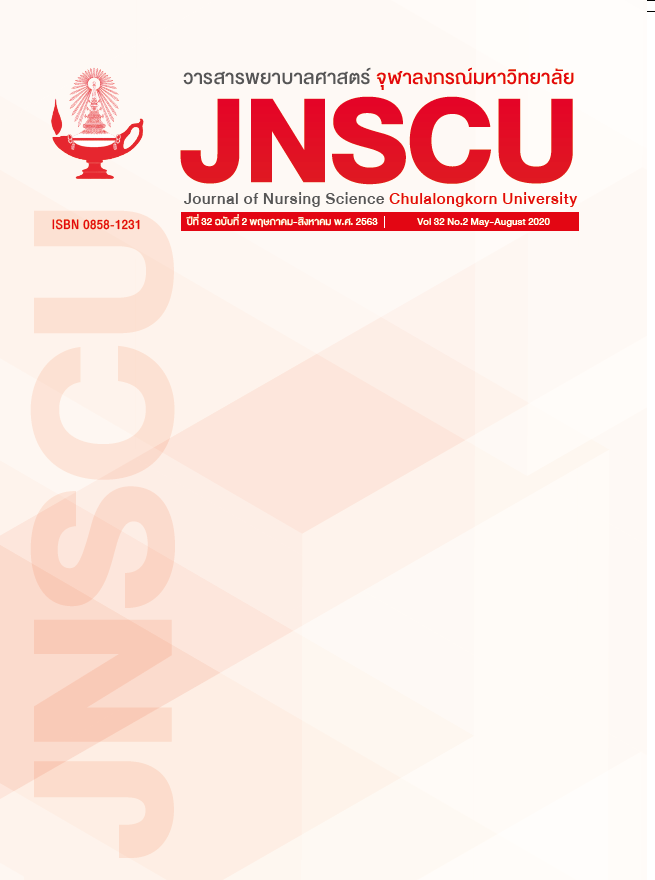วาทกรรมชุมชนต่อความเป็นแม่และการเลี้ยงดูเด็กในพื้นที่ภาคเหนือ
คำสำคัญ:
วาทกรรมชุมชน, ความเป็นแม่, การเลี้ยงดูลูก, วาทกรรมวิเคราะห์เชิงวิพากษ์บทคัดย่อ
วัตถุประสงค์: เพื่อศึกษากระบวนการสร้างวาทกรมความเป็นแม่และการเลี้ยงดูเด็กในชุมชน ปฏิบัติการทางวาทกรรมและภาคปฏิบัติทางสังคมวัฒนธรรม
แบบแผนการวิจัย: การศึกษานี้ดำเนินการวิจัยโดยใช้การวิจัยเชิงคุณภาพแบบวาทกรรมวิเคราะห์เชิงวิพากษ์
วิธีดำเนินการวิจัย: ผู้ให้ข้อมูล จำนวน90 คน ประกอบด้วย (1) ผู้ให้ข้อมูลหลัก เป็นผู้ที่มีความรอบรู้ข้อมูลอย่างลึกซึ้ง จำนวน 84 คน ได้แก่ ปราชญ์ ผู้นำชุมชน บุคลากรสุขภาพ แกนนำกลุ่มองค์กร ครูในศูนย์พัฒนาเด็กเล็กและในโรงเรียน ผู้นำศาสนา หญิงตั้งครรภ์ แม่หลังคลอด สมาชิกในครอบครัวแม่และเด็ก อาสาสมัคร ผู้บริหารและเจ้าหน้าที่ในองค์กรปกครองส่วนท้องถิ่น แกนนำศูนย์พัฒนาครอบครัว (2) ผู้ให้ข้อมูลทั่วไป 6 คนได้แก่ สมาชิกในชุมชนและผู้ที่เกี่ยวข้องในการดูแลแม่และเด็ก คัดเลือกแบบะเจาะจงและแบบสโนว์บอลล์ เก็บรวบรวมข้อมูลโดยการสัมภาษณ์เชิงลึก การสังเกตแบบมีส่วนร่วม สนทนากลุ่ม วิเคราะห์ข้อมูลโดยวิธีการวิเคราะห์วาทกรรมเชิงวิพากษ์และวิเคราะห์เชิงเนื้อหา
ผลการวิจัย: ผลการศึกษาแบ่งเป็น 3 ส่วน ได้แก่ 1) ความหมายของความเป็นแม่และการเลี้ยงดูเด็กพบว่าความเป็นแม่และการเลี้ยงดูเด็กมีความหมายที่สัมพันธ์เชื่อมโยงกันเมื่อถูกสะท้อนผ่านมุมมองเชิงวัฒนธรรมของทั้งแม่ครอบครัว และผู้ที่มีส่วนเกี่ยวข้องในการดูแลแม่และเด็กในชุมชน 2) วาทกรรมความเป็นแม่และการเลี้ยงดูเด็กมี 2 อัตลักษณ์ คือ วาทกรรมเสริมพลังอำนาจ และวาทกรรมพึ่งพา และ 3) ผลกระทบของวาทกรรมความเป็นแม่และการเลี้ยงดูเด็กทำให้เกิดการปรับเปลี่ยนพฤติกรรมความเป็นแม่และการเลี้ยงดูเด็กที่เหมาะสม รวมทั้งการเกิดแนวทางใหม่ในการดูแลแม่และเด็กในชุมชน
สรุป: ผลการศึกษาสะท้อนให้เห็นว่าความหมายของความเป็นแม่และการเลี้ยงดูเด็กมีความเชื่อมโยงกันเมื่อถูกสะท้อนผ่านมุมมองเชิงวัฒนธรรม นอกจากนี้การค้นพบวาทกรรมเสริมพลังอำนาจสามารถนำใช้เป็นเครื่องมือในการเสริมสร้างความเข้มแข็งของชุมชนในการพัฒนาระบบการดูแลแม่และเด็กและส่งเสริมความเป็นแม่และการเลี้ยงดูลูกอย่างเป็นระบบ ซึ่งถือได้ว่ามีส่วนสำคัญต่อพยาบาลและผดุงครรภ์ผู้ที่มีบทบาสำคัญในการขับเคลื่อนการพัฒนาระบบการดูแลแม่และเด็กปฐมวัยได้
คำสำคัญ: วาทกรรมชุมชน, ความเป็นแม่, การเลี้ยงดูลูก, วาทกรรมวิเคราะห์เชิงวิพากษ์
เอกสารอ้างอิง
life: finding from the prospective cohort study of Thai children. Kathmandu University Medical Journal 2018; 16(61): 42-47.
2. Isaranurug S, Suthisukon P. Child rearing. Journal of Public Health and Development 2007; 5(1):
105-118.
3. O'reilly A, editor. Encyclopedia of motherhood. Sage Publications; 2010.
4. Sunderland J. Baby entertainer, bumbling assistant and line manager: Discourses of parental
identity in parentcraft texts. (Ed.) L. Litoselliti, Gender Identity and Discourse Analysis, (pp. 293-319) USA: John Benjamins; 2002.
5. Arendell T. Conceiving and investigating motherhood: The decade’s scholarship. Journal of
Marriage & Family 2000; 62 (4): 1192-207.
6. Fairclough N. Discourse in processes of social change: Transition in central and Eastern Europe.
Working Paper [Internet]. 2004 [cited 2019 Jul 27]. Available from: http://www.ling.lancs.ac.uk/staff/norman/paper1.doc
7. Paxson H. Making modern mothers: Ethics and family planning in urban Greece. USA: University
of California Press; 2004.
8. Dedeoglu AÖ. Discourses of motherhood and consumption practices of Turkish mothers. ACR
Gender and Consumer Behavior 2006; 1(3): 1-17.
9. Tapanya S. Attributions and attitudes of mothers and fathers in Thailand. Parenting 2011; 11(2-
3): 190-198.
10. UNICEF. UNICEF for every child. Bangkok: UNICEF Thailand; 2017.
11. Jaitieng A, Nuntaboot K. Community care system for families with children 0-5 years.
Suranaree Journal of Science and Technology 2018; 25(2): 201-212.
12. Lomrattananont C, Sriratanaban P. Ideal and actual motherhood identity of working women.
Journal of Social Science Srinakharinwirot University 2013; 16: 1-15.
13. Khaisingto P. Language and ideologies: breastfeeding discourse in social online. Journal of
language of language, religion and culture 2016; 35(special issue): 167-183.
14. Goodwin I, Spittle S. The European Union and the information society: Discourse, power and
policy. New media & society 2002; 4(2): 225-249.
15. Tunpattrakul W. Through ecofeminist eyes: woman, nature and maternal absence in Linda
Hogan’s Solar Storm. Journal of language of language, religion and culture 2018; 25(1): 79-103.
16. Carvalho JMN, Gaspar MFRF, Cardoso AMR. Challenges of motherhood in the voice of primiparous mothers: initial difficulties. Invest. Educ. Enferm. 2017; 35(3): 285-294.
เผยแพร่แล้ว
ฉบับ
ประเภทบทความ
สัญญาอนุญาต
ลิขสิทธิ์ (c) 2022 วารสารพยาบาลศาสตร์ จุฬาลงกรณ์มหาวิทยาลัย

อนุญาตภายใต้เงื่อนไข Creative Commons Attribution-NonCommercial-NoDerivatives 4.0 International License.
##default.contextSettings.thaijo.licenseTerms##


